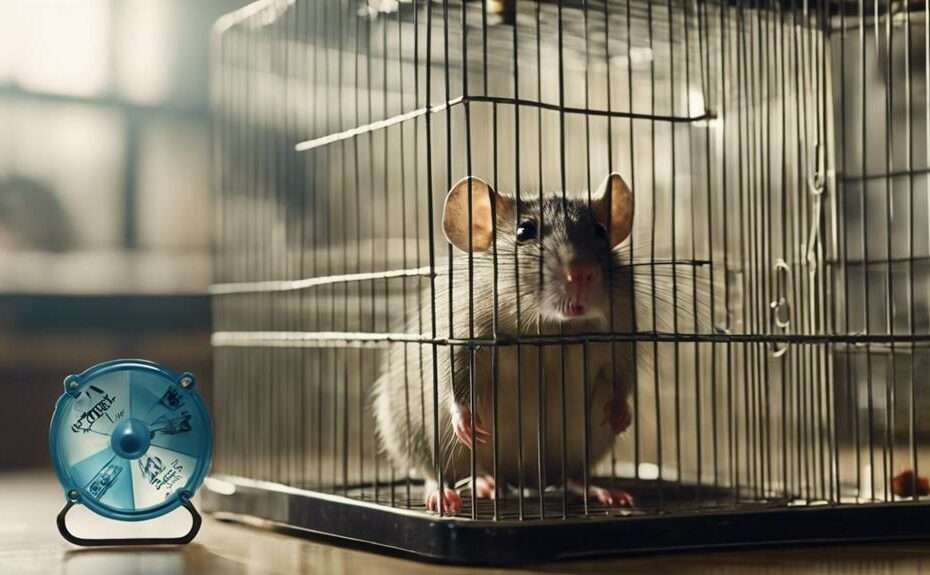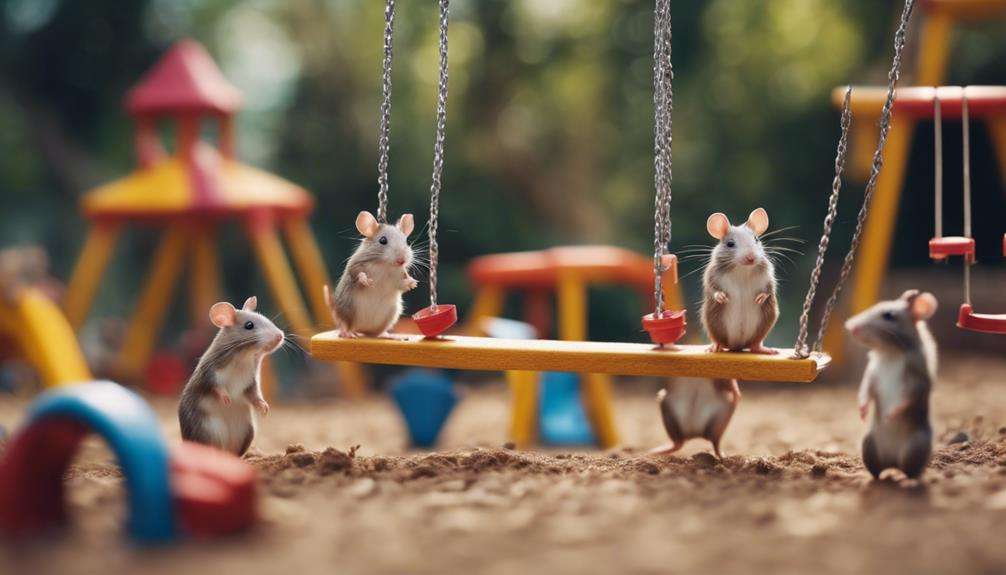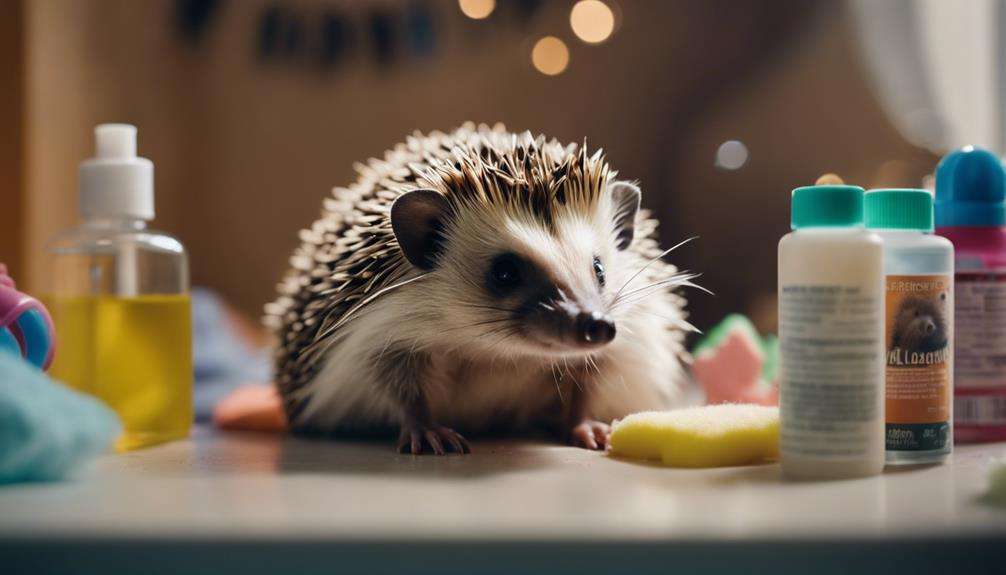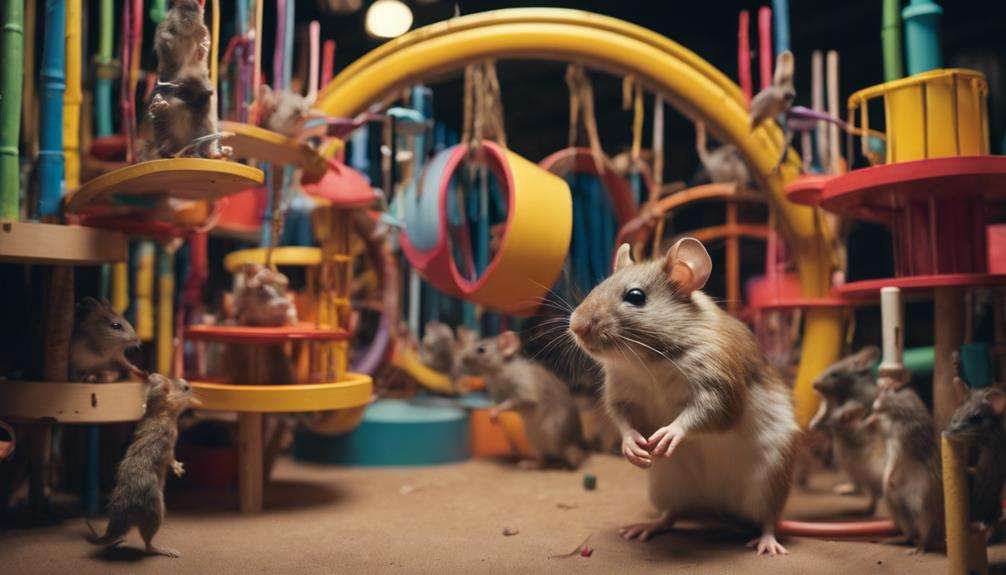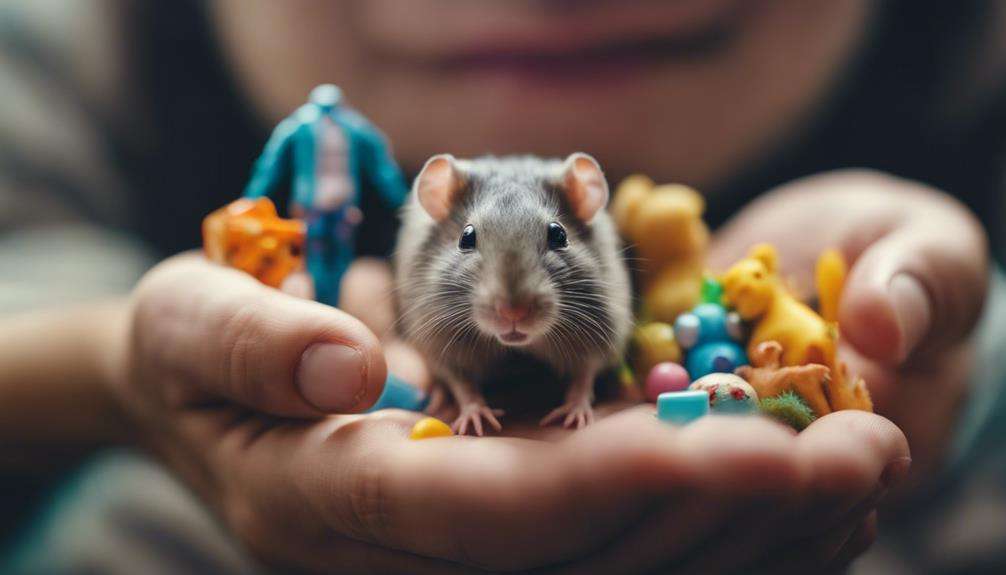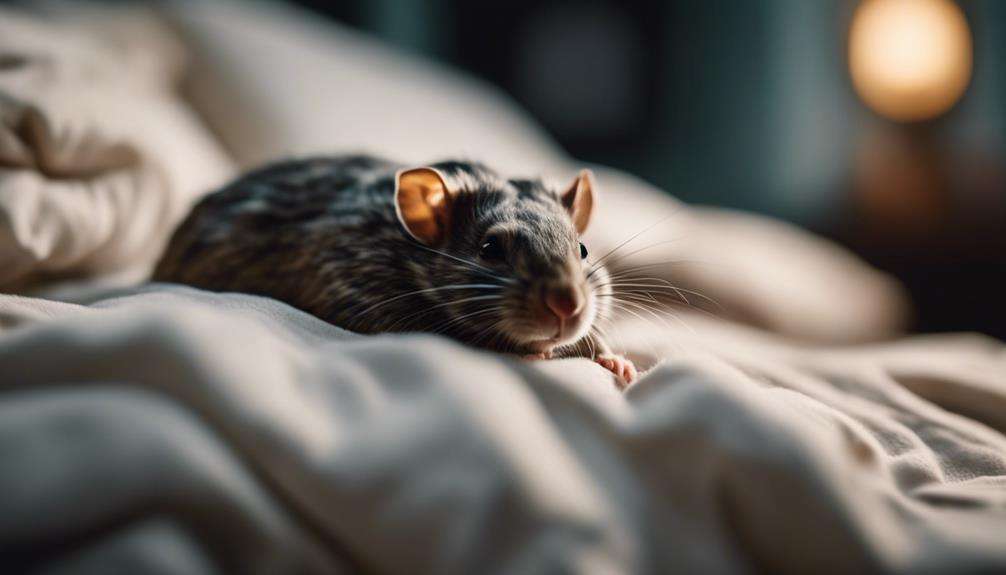If you're exploring the legal aspects of keeping pet rodents, it's essential to navigate through a maze of regulations. From import requirements to state-specific laws, a myriad of factors can influence your ownership experience.
You'll need to be mindful of restrictions based on species origins, breeding practices, and even liability concerns. As you delve into the legal landscape surrounding pet rodents, be prepared to encounter a complex web of rules and considerations that can significantly impact your furry companionship journey.
Key Takeaways
- Understand and comply with USDA APHIS regulations for pet rodent importation.
- Ensure adherence to state and federal laws for pet rodent ownership and care.
- Research and follow zoning laws and permit requirements for keeping pet rodents.
- Seek legal guidance to navigate age restrictions, ethical standards, and legal obligations.
USDA APHIS Regulations
When importing pet rodents, ensuring compliance with USDA APHIS regulations is crucial for a smooth and lawful process.
The Department of Agriculture (USDA) oversees the regulations concerning the importation of animals, including pet rodents, into the United States.
While USDA APHIS doesn't have specific health requirements for pet rodents, adherence to the regulations is still necessary. These regulations are in place to ensure the safety and well-being of both the animals and the public.
Additionally, the Animal Welfare Act (AWA), enforced by the USDA, sets standards for the care and treatment of animals in research, exhibition, transport, and by dealers. This act plays a significant role in regulating the importation of pet rodents to guarantee they're treated humanely throughout the process.
Therefore, contacting USDA APHIS to understand and follow the specific import requirements for pet rodents is essential to avoid any legal issues and ensure a smooth importation process.
State-Specific Legal Requirements
When navigating state-specific legal requirements for pet rodents, it's crucial to grasp the State Laws Overview, Licensing and Permits, and Housing Regulations.
Understanding these key points will help you ensure compliance and provide the best care for your pet rodents.
Checking with the Department of Agriculture or State Veterinarian's Office will offer detailed insights tailored to your destination state.
State Laws Overview
State-specific legal requirements play a crucial role in determining the permissibility of owning certain pet rodents like ferrets in various states, such as California. Regulations regarding the importation or ownership of pet rodents vary widely, and compliance is essential to avoid legal issues.
State Departments of Agriculture or State Veterinarian's Offices are valuable resources for understanding these laws. The Animal Welfare Act (AWA) enforced by the USDA sets standards for the care and treatment of certain animals, including some rodents.
Being aware of state laws ensures responsible ownership and proper care of pet rodents, promoting their well-being and legal status within different regions. Stay informed and compliant to enjoy a harmonious relationship with your pet rodents while abiding by the law.
Licensing and Permits
To ensure compliance with state-specific legal requirements for owning pet rodents, understanding the licensing and permit obligations is crucial. Some states mandate licenses and permits for owning pet rodents to ensure adherence to regulations like the Animal Welfare Act (AWA).
These regulations may cover aspects such as the types of rodents allowed as pets and the necessary documentation for ownership. It's essential to research your state's specific laws regarding pet rodents to avoid potential legal repercussions. Failure to obtain the required permits or licenses can lead to penalties or confiscation of the rodents.
Housing Regulations
Understanding the diverse legal requirements for housing pet rodents is essential to ensure their well-being and prevent potential legal complications. When it comes to housing regulations for pet rodents, state-specific laws play a crucial role in dictating the standards for their living conditions. Here are some key points to consider:
- Regulations may encompass cage size, bedding materials, and environmental enrichment for the genus Mus.
- Some states mandate specific conditions to prevent cruelty and ensure animal care and use.
- Ventilation, temperature control, and lighting in pet rodent enclosures might be regulated.
- Compliance with these regulations is vital for providing a safe and comfortable environment for pet rodents.
- Adhering to state-specific housing requirements can help avoid legal issues and ensure proper care for these small animals.
Health and Safety Guidelines
When it comes to health and safety guidelines for your pet rodents, there are key points to consider.
Cage size requirements ensure your rodents have ample space to move and play.
Proper diet essentials and handling practices are crucial for their well-being.
Cage Size Requirements
For optimal health and safety of your pet rodents, ensuring adequate cage size is essential to accommodate their movement, exercise, and natural behaviors.
When considering cage size requirements for your pet rodents, here are some key points to keep in mind:
- The USDA doesn't have specific cage size requirements for pet rodents entering the U.S.
- Provide enough space in the cage for your pet rodents to move freely.
- Check with airlines for any cage size restrictions or recommendations when traveling with your pet rodents.
- Larger cages with multiple levels, hiding spots, and toys can promote their well-being and mental stimulation.
- Ensure the cage is escape-proof, well-ventilated, and easy to clean to maintain the health and safety of your pet rodents.
Proper Diet Essentials
To ensure the health and safety of your pet rodents, it's crucial to provide them with a proper diet rich in hay, fresh vegetables, and fortified pellets. Pet rodents, like any other animals, have specific dietary needs essential for their well-being. Following the guidelines set by the Animal Welfare Act (AWA) is imperative to promote good animal health.
Avoid feeding your rodents high-fat, sugary, or salty foods as these can lead to obesity and related health issues. Additionally, always ensure they have access to fresh water daily to keep them hydrated. While fruits and nuts can be given as occasional treats, remember that moderation is key to prevent any potential digestive problems.
For personalized advice on diet and overall health assessments for your pet rodents, consulting with a veterinarian specializing in exotic pets is highly recommended.
Handling and Hygiene
Maintaining proper handling and hygiene practices is essential to ensure the health and safety of your pet rodents.
- Regular cage cleaning and waste removal help prevent the spread of diseases and maintain a clean environment for pet rodents.
- Washing hands thoroughly before and after handling pet rodents reduces the risk of transmitting bacteria or viruses.
- Providing a balanced diet, fresh water, and a clean living space are essential for the overall well-being of pet rodents.
- Monitoring the health of pet rodents and seeking veterinary care promptly if any signs of illness or distress are observed is important for their welfare.
- Compliance with the Animal Welfare Act (AWA) regulations enforced by the Department of Agriculture (USDA) is crucial to ensure proper care and treatment of pet rodents.
Breeding and Sales Restrictions
Breeding and sales restrictions for pet rodents are subject to varying state and local regulations, necessitating compliance with licensing and permit requirements for breeders and sellers. The Department of Agriculture (USDA) and the Animal Welfare Act (AWA) play crucial roles in overseeing these regulations to ensure the welfare of pet rodents.
Some states prohibit the breeding and sale of certain rodent species as pets, aiming to prevent the proliferation of invasive species or those deemed dangerous to public health. Additionally, regulations may limit the number of litters a rodent can have or set a minimum age for their sale to protect the animals from being exploited or mistreated.
It is essential for breeders and sellers to be aware of these restrictions to avoid legal consequences and penalties. Violation of breeding and sales regulations can lead to fines, confiscation of animals, or even the revocation of breeding permits. By staying informed and compliant with the relevant laws, individuals involved in breeding and selling pet rodents can contribute to upholding ethical standards and ensuring the well-being of these small animals.
Zoning Laws and Permitting

You need to be aware of zoning laws that might restrict where you can keep your pet rodents. Some areas may require permits to make sure you comply with local regulations.
It's crucial to understand and adhere to these laws to avoid any legal issues related to owning pet rodents.
Zoning Regulations for Rodents
Understanding the zoning regulations for pet rodents is crucial for responsible ownership and compliance with local laws.
- Zoning regulations may restrict the keeping of pet rodents based on land use designations.
- Permits or licenses may be required to own pet rodents, depending on specific zoning laws.
- Maximum limits on the number of pet rodents allowed per household or property may be specified.
- Non-compliance with zoning regulations can lead to fines, penalties, or removal of the animals.
- Research and understand the zoning laws and permitting requirements in your area to ensure lawful ownership.
Being aware of these factors will help you navigate the regulations effectively and enjoy owning pet rodents without any legal issues.
Permit Requirements for Rodents
When considering owning pet rodents, it's essential to understand the permit requirements dictated by zoning laws and permitting regulations in your area. Zoning laws may restrict or require special permits for keeping rodents as pets. Some states or localities have specific permitting requirements related to the Animal Welfare Act (AWA) for the welfare of rodents.
It's crucial to research and comply with these regulations to ensure legal ownership of pet rodents. Failure to obtain necessary permits or follow zoning laws can lead to fines or other legal consequences. By adhering to local regulations and obtaining the required permits, you can demonstrate responsible ownership of rodents and avoid potential legal issues.
Compliance With Local Laws
To ensure legal ownership of pet rodents, it's crucial to comply with local laws, including zoning regulations and permitting requirements in your area.
- Zoning laws may restrict or permit the keeping of pet rodents in certain areas based on residential or commercial designations.
- Compliance with local zoning laws is essential to avoid fines or penalties related to housing pet rodents.
- Some areas may require specific permits or licenses for keeping pet rodents, which must be obtained to legally own them.
- Understanding local laws and regulations regarding pet rodents can help prevent legal issues or conflicts with authorities.
- Researching and adhering to local zoning laws and permitting requirements is crucial before acquiring pet rodents as pets.
Familiarizing yourself with the Animal Welfare Act (AWA) and Department of Agriculture (USDA) guidelines can also provide additional insights into legal responsibilities concerning pet rodents.
Transport and Shipping Regulations
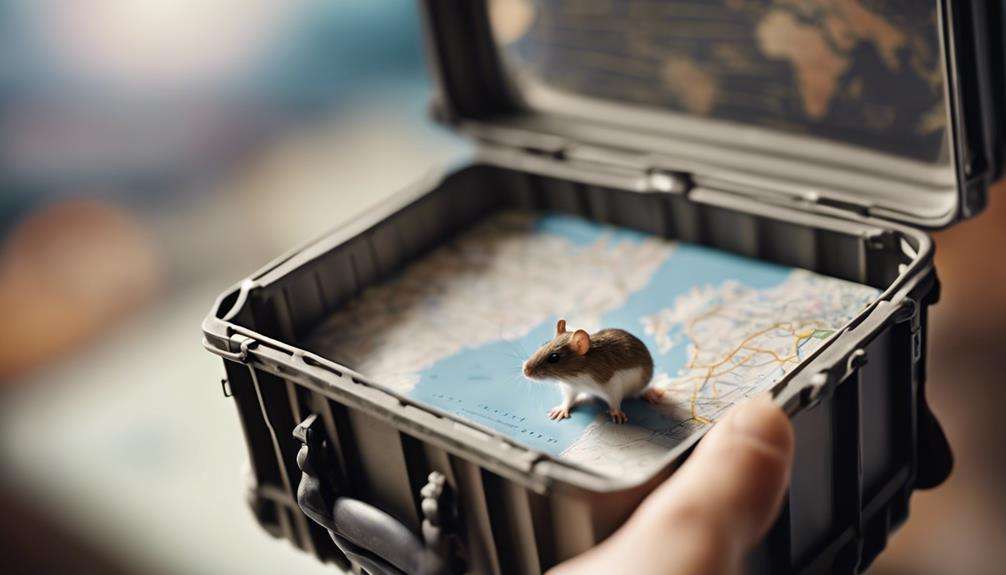
Pet owners must ensure compliance with shipping regulations to prevent entry refusal for their pet rodents. The Animal Welfare Act (AWA) regulates the transportation of certain animals, including rodents, within the United States.
Additionally, the Department of Agriculture (USDA) plays a crucial role in overseeing the import and export of animals, ensuring they meet specific health and welfare standards. It's important to note that the Centers for Disease Control and Prevention (CDC) prohibits the importation of rodents of African origin into the U.S.
To avoid any complications or delays, pet owners should carefully verify the specific import requirements when traveling with their pet rodents. State-specific transport regulations may also apply, and contacting the State Department of Agriculture can provide detailed information on these regulations.
Legal Considerations for Exotic Species
Ensuring compliance with legal regulations is essential when considering exotic species of pet rodents, as their non-native status may subject them to additional legal considerations and restrictions. When dealing with exotic species, it's crucial to be aware of the following legal aspects:
- State Laws: Some states have specific regulations regarding the ownership and importation of exotic pet rodents.
- Species-specific Restrictions: Legal restrictions may vary depending on the species of exotic pet rodent, with some species being prohibited for ownership.
- Compliance with Regulations: To avoid legal issues, it's vital to comply with both state and federal regulations when considering exotic pet rodents.
- Permit Requirements: Importing exotic pet rodents may necessitate permits or documentation to ensure adherence to legal requirements.
- Animal Welfare Act (AWA): Understanding the provisions of the Animal Welfare Act is crucial when dealing with exotic species to ensure the animals' well-being and proper care.
Being knowledgeable about these legal considerations will help you navigate the complexities of owning exotic pet rodents responsibly.
Liability and Insurance Coverage
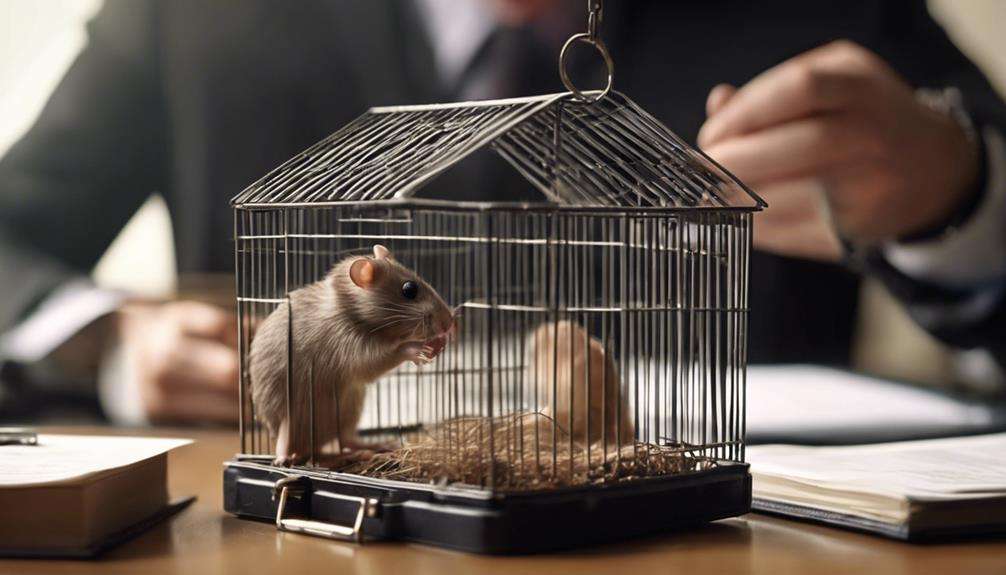
Understanding the importance of liability insurance and coverage for pet rodents is essential for responsible ownership and protection against potential risks. Liability insurance can play a crucial role in safeguarding pet owners in the event that their rodent causes property damage or injury to others. Homeowner's insurance policies often include liability coverage for incidents involving pets, including those related to pet rodents.
However, it's important to review policy details as some insurance companies may have specific exclusions for certain types of pets. For owners seeking additional protection, rodent-specific insurance coverage may be available to address concerns about potential risks associated with their pets.
Being well-informed about liability coverage options is paramount for pet owners to ensure they've financial security in case of unforeseen events involving their pet rodents. Familiarizing yourself with these insurance aspects can help mitigate risks and ensure responsible pet ownership under legal guidelines such as the Animal Welfare Act (AWA).
Endangered Species Protections
To comply with legal regulations and protect endangered rodent species, it's crucial to understand the provisions of the Endangered Species Act (ESA) and how they apply to certain species facing extinction. Here are some key points to consider:
- Endangered species protections under the ESA apply to certain species of rodents facing extinction.
- The ESA prohibits the import, export, and sale of endangered rodent species and their products without proper permits.
- Rodents listed as endangered receive special protections to prevent their extinction and promote conservation efforts.
- Violations of the ESA regarding endangered rodents can result in significant fines and penalties.
- It's crucial to verify the status of rodent species under the ESA before importing or owning them as pets.
When dealing with endangered rodent species, it's essential to adhere to the regulations set forth by the Department of Agriculture (USDA) and the Fish and Wildlife Service to ensure the protection and preservation of these vulnerable animals.
Legal Resources and Support

Legal resources such as the USDA offer essential guidance on the importation of pet rodents. The Department of Agriculture (USDA) provides valuable support to help you navigate and adhere to legal requirements when bringing pet rodents into the country.
Under the Animal Welfare Act (AWA), regulations from various U.S. agencies govern the import of these animals to ensure their well-being and safety. It's crucial to not only follow federal regulations but also to ensure compliance with state-specific laws that may have additional requirements or restrictions.
If you have any questions or need assistance regarding the legal aspects of importing pet rodents, reaching out to the USDA can provide you with the necessary information and support. By staying informed and seeking guidance from reliable sources like the USDA, you can ensure that your actions align with legal standards and promote the welfare of your pet rodents.
Frequently Asked Questions
What Are the Criteria for a Rodent?
When looking at criteria for a rodent, consider housing requirements like appropriate cage size and bedding materials. Health considerations such as regular veterinary check-ups and a proper diet are crucial for your pet's well-being.
What Are the Considerations for Rats?
When considering rat welfare and housing, ensure proper ventilation, bedding, and space. Remember, "where there's a will, there's a way." Compliance with legal regulations, like CDC bans and state-specific rules, is vital for responsible rat ownership.
Which Federal Regulations Does Not Cover the Use of Rodents in Research?
Federal regulations do not cover the use of rodents in research, excluding them from Animal Welfare Act protection. This exemption raises concerns about animal welfare, research ethics, and laboratory standards in the context of animal testing.
Can You Keep Rodents as Pets?
Keeping rodents as pets can be a rewarding experience. Rodent care involves providing a suitable habitat, proper nutrition, and regular vet check-ups. Breeding restrictions may apply, so ensure you understand local laws before expanding your furry family.
Conclusion
So there you have it – navigating the legal landscape of pet rodents may seem like a walk in the park, but don't be fooled. With a maze of regulations and restrictions to follow, one wrong turn could land you in a legal quagmire.
So tread carefully, dear pet owner, and remember: the legal world of pet rodents is no small matter. Stay informed, stay compliant, and avoid the pitfalls that could leave you squeaking for help.
